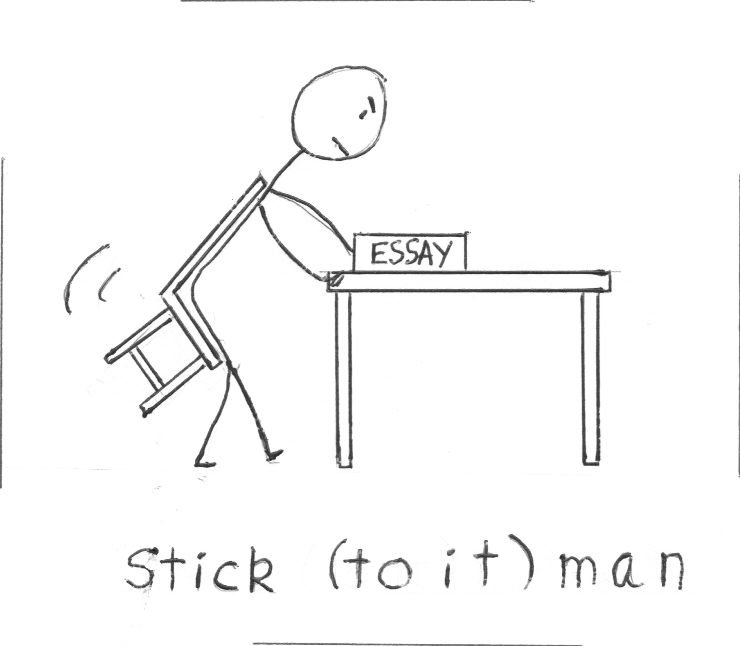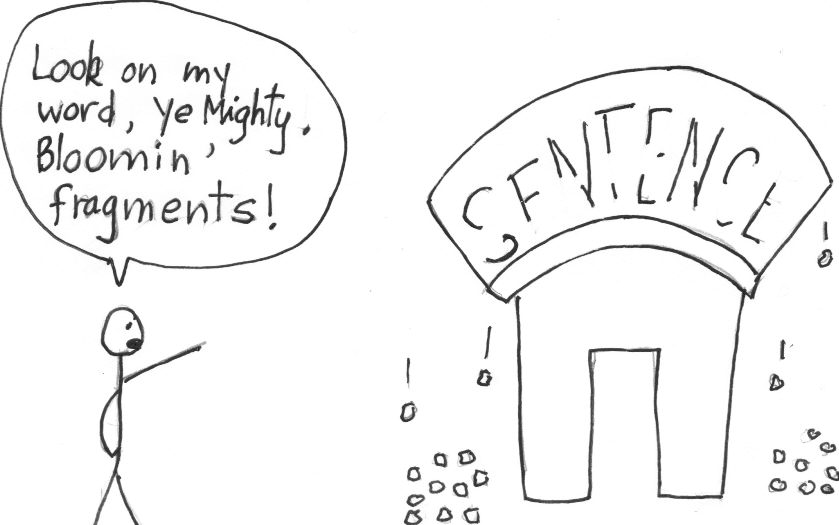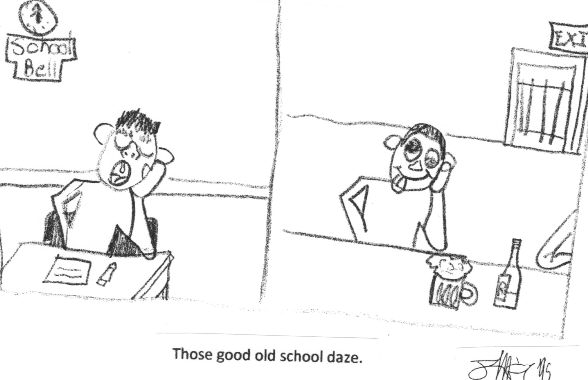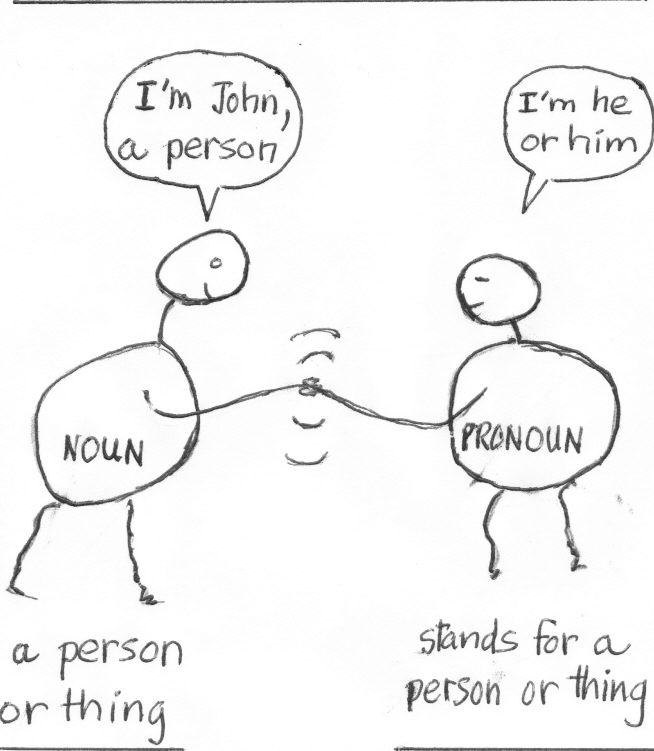Why bother to write well? There are all kinds of answers to this broad question of purpose. Over 4000 years ago in ancient Egypt a father instructed his son to become a scribe, because that way he could have a nice job and security rather than a hard job with no security. Much later, generations of children in the American colonies studied from a textbook called The New England Primer. The Primer warned students that: "He who learns his letters fair/Shall have a coach to take the air;/ But he who ne'er learns his ABC/Forever will a blockhead be." More scientific forms of this argument are all around us today, for example in the statistics which show that higher education is correlated with higher income. But there are other reasons to bother.
 |
It is a fact that the (often hard) process of finding the words to express our thoughts in writing is itself one of the best ways to understand and to learn. Beyond this too, there can be joy in successfully communicating our ideas to others and pleasure from having found a fresh and interesting way to express an idea.
Many English classes, and other classes, require students to write essays. Often this means the expository essay, which is an essay written to expound a case for some position or point of view--a thesis. (Expositories should not be confused with suppositories, of course, although some writers and readers believe they are related.)
Writing an expository essay involves a writing process. Hatman's version of the writing process, simplified so that he can understand it, consists of three steps: planning, writing and revising.
Planning means all the things necessary to get ready to write, such as: reading the primary text(s) at least once to start with, notebook and journal entries about potential topics, research in primary and secondary texts (resulting in note cards, pages, or entries on a computer), freewriting, and outlining.
A primary text is the main text to be discussed in the essay; in an English class it might be a poem, story, novel, play or work of non-fictional prose; a supporting text is a work of critical interpretation of, or historical background to the main text; an essay generally stands or falls on the basis of the evidence from the primary text (just as in a court case direct evidence from a witness is more persuasive than second-hand or hearsay evidence).
Some writers prefer long and very detailed outlines, some like only a couple of lines on a scrap of paper; it always depends on the project, but usually it is good to have an outline with enough detail to set the direction, but not so much detail that there is no scope for creative changes as you proceed.
Writing is the second stage of the process--getting your ideas on to the page or the screen. Writing essays (or theses) can certainly involve mysterious flashes of inspiration which result in frenzied scribbling (at midnight, by candlelight, drinking copious glasses of wine from leather-covered flagons.) But often the process is more ordinary.
Like many other tasks, writing begins with an objective. I want to build a table--how big will the table be, and what will it be made of? I want to write an essay about this story--what question will the essay explore and attempt to answer and what will be the evidence?
One way to get an essay started is to copy the primary passages which you plan to use as the evidence for your argument. For example, if your topic is the character of Hamlet, and your argument is that Hamlet's tragedy results from his poor decisions, then your evidence will have to be at least several passages from the play (the primary source) showing Hamlet in these bad-decision-making moments.
You may find a passage which doesn't fit the pattern of your argument, because Hamlet makes what you think is a good decision. Your essay could include this to demonstrate the complexity of the play. Or you might change your mind as you write, and argue instead that despite Hamlet's good decisions the forces against him were too strong.
The supporting sources you consult in your research might provide useful perspectives about Shakespeare's times, his theatre, the ways in which the Elizabethans understood character or gender, and so forth. These can be included to support and contrast with your views, but they should not be substituted for, or obscure, the case you make based on the evidence of the primary text.
This advice arises from a conviction about scholarship and the nature of the university. Universities are institutions with traditions that go back centuries, and they seem to be very hierarchical, especially at Convocation time when all the officials and dignitaries parade in their colourful formal robes. And yet, universities are really profoundly democratic institutions at their core, meaning in relation to their scholarly mission of discovering and passing on knowledge. Any scholar, whether PhD professor or first-year student, can offer an original insight about Hamlet's character, because each person brings his or her own unique personality and experience to bear on the question. Oftentimes in classes, students offer some insight which is new to the professor, a phenomenon which can happen in science classes as well as humanities and social science classes. This sometimes creates tensions, if professors are unwilling to recognize that a first-year student could have an original insight; however, most professors are delighted when this happens, because they believe in the democracy of scholarship which says that new insights and solutions can come from anywhere and from anyone. The legitimacy of an opinion is ultimately not based on the position or the degrees held by a person, but by the evidence put forward, whether that evidence is textual, contextual, or scientific.
The third stage of the writing process is revising. Very few good essays are dashed off in one draft. Usually first drafts need to be worked on to improve both content and presentation.
 |
Content questions to include: Have I left out passages from the primary text which offer better support than the ones I chose first? Are there passages which undermine or contradict my position? It is often useful to discuss these--note how debaters and parliamentarians will summarize opposing arguments in a way which develops their own positions. Are there secondary sources I could include which would add some depth to the presentation, or which might make an interesting connection with history, another art form, some aspect of popular culture? Is it clear that I know what I'm talking about when I use terms like "tragedy"? Usually this doesn't mean to insert a dictionary definition, but rather to show understanding by using the term in appropriate ways. Does the title of the paper offer a useful guide to its content? In the example about Hamlet, the titles "Shakespeare" or Hamlet" or even "Hamlet's Character" would be too broad, whereas "Hamlet's Bad Decision in Act Three" would give a reader much more sense of what this essay will be about.
Presentation questions include: Are the main points organized in a coherent order? Many professional scholars will write about a text following, more or less, the outline of the text itself. This is because the reader also has this structure in mind, and therefore has a comfort-level with this outline. As well, many texts involve narrative, and the development of characters, and it can make sense to follow these progressions. Does the first paragraph introduce the topic, explain alternatives, describe the question to be explored and the position to be taken on the question? Do the body paragraphs each deal with some aspect of the topic? Do they use their topic sentences to signpost this for the reader? For example, paragraph 2 of the essay could begin as follows: "In Act 1, Hamlet's knowledge is very limited and his inaction could be described as caution rather than procrastination." Such a sentence would alert the reader that this paragraph will deal with Act 1, and also the aspect to be discussed and illustrated by the quoted evidence.
In addition to organization and effective paragraphing, the presentation of an essay also involves matters of format and correctness. Format requirements are a fact of life in this world. Engineers must format their plans in a certain way to be considered for building permits. Figure skaters have to include certain required elements in their programs. Professional writers have to follow the format requirements of their publishing companies. In university classes, the format requirements are usually specified for assignments--such as to follow the Modern Language Association (or MLA) format.
Fact of life or not, format requirements can sometimes be contentious, and the same is true of the requirement for correctness of grammar and spelling. Some will point out that in Shakespeare's day spelling was all over the place and this didn't seem to hurt anything. On the other hand, some professors have been known to lament the decline of reading and the rise of electronic texting which often disregards the rules of spelling and grammar. Others cite the cultural disadvantage of requiring "correctness" for some students whose language skills evolved from a different community, or whose tradition might be oral rather than written.
These are difficult questions and there are no easy answers. What we need to try to do is find a reasonable balance. Too much emphasis on correctness can indeed be stifling and even de-humanizing. Yet to ignore correctness can produce bad results too. This is clear for the person who buys a new car which doesn't work, takes it back, and is told "Hey, this is our version of a new car--get used to it!" Or imagine the pilot who says to the navigator "Aw, that's close enough--we'll wing it." Of course, in writing essays correctness is usually not a matter of life or death, and there is a legitimate argument that content should be regarded as more important. However, an accumulation of writing problems can make the essay more difficult to understand for the reader. It can also signal that the writer doesn't know the conventions or doesn't care enough to check.
Clarity is more significant than correctness. Clarity comes from writing coherent sentences which have subjects and verbs, in which clauses are not mis-placed, and in which the things which need to agree (such as pronouns) do agree. Two ways to try to ensure this are: (1) to read your draft out loud to yourself, while moving your pen along under each word as you read it. If we read silently our smart human brains tend to correct things automatically, so that we might not even notice that something doesn't quite make sense. Reading aloud opens another channel to the brain and really helps with the recognition of sentences and words which need work; (2) to ask someone else to read the essay and mark any sentences which don't make sense.
As for correctness, spell-check programs can help with spelling, but sometimes they don't recognize mistakes, so careful proofreading is important. Reading aloud and using a dictionary are useful. Pay particular attention to important words which are repeated, such as the names of characters. An essay which used "Hammlet" twenty times in a few pages would be, as the expression goes, shooting itself in the foot. Occasionally individuals have problems processing words and letters in the correct order, and this might require professional assistance.
Here are some examples of the kinds of grammatical issues which turn up in essays (and not only by students):
Sentence Fragments (or incomplete sentences)
check that each sentence has a subject and a verb
"To be or not to be" is a soliloquy. The actor alone on stage. [The actor is alone on stage.]

Comma Splices (sentences which should be separated are "spliced" together with commas]
Hamlet decides at this point, the play changes his mind. [Hamlet decides at this point. The play changes his mind.]
Run-on Sentences (sentences which should be separate are run together with no punctuation)
Hamlet procrastinates Laertes is decisive. [Hamlet procrastinates. Laertes is decisive.]
Misplaced Clauses (clauses which are in the wrong place in a sentence and do not relate to what they modify)
As a woman, Hamlet thinks that Ophelia is attractive. [Hamlet thinks that Ophelia is attractive as a woman.]
Verb and Subject Agreement (a singular subject needs a singlular verb; a plural subject needs a plural verb)
Hamlet and Ophelia loves each other. [Hamlet and Ophelia love each other.]
Verb Tense Shifts (verb tenses should be consistent; the convention is to write about literature in the present tense, occasionally using the past tense for clarity)
In Act 3 Hamlet saw Claudius at prayer. [In Act 3 Hamlet sees Claudius at prayer.]
 |
Inclusive Language
(avoid sexist or racist language; rather than use he/she to avoid sexist language, rewrite the sentence another way)
If the reader thinks Hamlet is intelligent, he/she is wrong. [Hamlet does not make an intelligent choice.]
Pronoun References (it must be clear to whom or what pronouns refer; pronouns must agree in gender and number)
Hamlet and Claudius are alone on stage. He is perplexed. [Hamlet and Claudius are alone on stage. Claudius is perplexed.] If the reader thinks Hamlet is smart, they are wrong. [If readers think Hamlet is smart, they are wrong.]
Articles (use the definite article when writing of a particular thing, but usually not with proper nouns)
Hamlet visited castle. [Hamlet visited the castle.]
Something is rotten in the Denmark. [Something is rotten in Denmark.]
Style. Often the guides for expository writing style will recommend: keeping sentence elements in parallel form [not "Hamlet is intelligent or thinks too much," but "Hamlet is intelligent or too thoughtful"]; avoiding too many sentences of one type [for example--"Hamlet enters. Hamlet sees Claudius. He is angry. He decides." etc]; using passive rather than active verbs [not "Polonius is stabbed by Hamlet" but "Hamlet stabs Polonius"]; avoiding inappropriate diction such as slang, vulgarity, pomposity, over-used expressions and jargon--"Hamlet is a weird dude, man. In the humble opinion of this essay writer Hamlet is one of a kind, a psychomachist"
Incorrect Diction (use the correct word to express the desired meaning)
Hamlet's interpretation of the situation is incorrigible. [Hamlet's interpretation of the situation is incorrect.]
 |
Punctuation. Use apostrophes to indicate possession, being careful about number as in "the student's paper" and "the students' papers"; the convention is not to use contractions in formal essays--instead of "they don't" use "they do not"; "it's" means "it is," as in "It's a nice day," whereas "its" means belonging, as in "The house lost its roof in the tornado." Italics and underlining are used for foreign words and phrases, book and magazine titles; quotation marks are used to indicate a shorter piece such as a story, poem or single article. Be familiar with the use of standard punctuation marks: period--end of a sentence; comma--end of a clause, items in a series; colon--indicates information such as a list to follow; semi-colon--a stronger pause than a comma (note that items set off by a semi-colon must have both subject and verb like a complete sentence); a dash (--) sets off ideas while a hyphen (-) is a link to make compound words such as table-tennis; parentheses ( ) are used to set off explanatory ideas or translations while brackets [ ] often indicate editorial changes which the essay writer might make to the text for emphasis: "To be or not to be? [Those are] the [questions]."
 |
|








